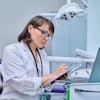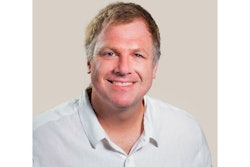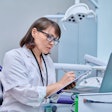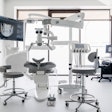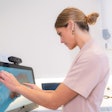The year 2024 brought significant changes to dentistry, and 2025 promises even more transformational shifts. With technology advancing at an accelerated pace, patient expectations continuing to rise, and dental operations becoming more complex, dental service organizations (DSOs) using outdated systems and technology will be outpaced by those using modern, integrated solutions.
As we look to 2025, several technology trends are set to change how dental practices operate, innovate, and grow. Here are my predictions for the year ahead that DSOs should keep on their radar to maintain a competitive edge.
The end of legacy practice management and data silos
 Eric Giesecke.
Eric Giesecke.
Legacy practice management systems have long been the default standard for DSOs, but it's time to recognize that these are fundamentally broken and stifling growth. These fragmented solutions trap data in isolated silos, making it difficult to achieve operational efficiency or provide top-notch patient experiences. From billing to scheduling to patient records, the lack of integration leads to redundancies, errors, and missed opportunities.
In 2025, the shift from these outdated systems will only accelerate. The future lies in platforms that prioritize interoperability and scalability. These systems will enable DSOs to unify their operations, allowing real-time data sharing across locations and departments. The result? A smoother workflow, reduced administrative burden, and more time for what matters most: patient care.
AI = Efficiency
Artificial intelligence (AI) has already reshaped industries worldwide, and dentistry is no exception. As DSOs increasingly adopt AI-driven solutions, the benefits are clear: greater efficiency, reduced costs, and improved outcomes. Routine tasks like appointment scheduling, insurance verification, and even diagnostic support can be automated, freeing up staff to focus on higher-value activities.
By leveraging machine learning and predictive analytics, dental practices can anticipate patient needs, optimize schedules, and enhance resource allocation. For example, AI-powered tools can analyze patient data to identify trends, such as high cancellation rates, and recommend proactive strategies to mitigate them. AI will no longer just be new shiny tech -- implementing it will become a necessity, not a luxury, in order to keep up.
Modular solutions for customizable tech stacks become the norm
The one-size-fits-all approach to dental software is quickly becoming obsolete. DSOs today are as diverse as the patients they serve, and their technological needs vary widely. Open API-driven solutions that allow multilocation practices to select and integrate the tools that work best for them are gaining traction.
Rather than being locked into a one-size-fits-all system, DSOs can now build ecosystems tailored to their specific needs. These flexible solutions can scale as organizations grow, ensuring that technology adapts alongside business demands. For example, a growing DSO might initially focus on integrating patient management tools and then later add advanced analytics or imaging capabilities without disrupting existing workflows. I predict that mixing and matching technology through APIs will be one of the biggest shake-ups the industry has seen in decades and will allow DSOs to future-proof their businesses.
Patients will drive the evolution of dental software
Patients are no longer passive participants in their healthcare journey. They're informed, engaged, and expect a level of convenience and personalization that rivals leading consumer brands. Dental providers must adapt to these rising expectations, and software will play a pivotal role in making this shift possible.
Patients now demand transparent pricing, easy access to treatment plans and records, and seamless communication with their providers. Features like self-scheduling, automated reminders, and postvisit follow-ups will become table stakes to meet expectations.
Moving forward, DSOs will need software that not only enhances the patient experience but also fosters trust and loyalty. Patient-centric solutions will become the standard to attract and retain patients in an increasingly competitive market.
Data will no longer go unnoticed
The saying "knowledge is power" holds particularly true in dentistry, where data-driven insights can significantly impact operations and patient care. However, many DSOs are still operating with disparate systems that prevent them from fully leveraging their data to make decisions. Unified platforms that consolidate patient records, financial metrics, and operational data into a single source of truth are key to unlocking this potential.
Real-time analytics will become a central component of DSO strategies in 2025. Imagine the ability to track schedule utilization across multiple locations, identify bottlenecks in patient flow, or analyze treatment success rates -- all from a centralized dashboard. Such insights empower dental leaders to make the right decisions that optimize resources and ultimately improve patient outcomes. As data analytics continues to evolve, the dental industry will see unprecedented levels of transparency and operational control.
Preparing for the future of dentistry
For DSOs to thrive, they must embrace technology that fosters innovation, flexibility, and scalability. This means moving beyond the confines of legacy systems and adopting solutions that integrate seamlessly, empower patients, and deliver actionable insights.
The next generation of dental software will not just solve today’s problems, but it will also anticipate and adapt to the challenges of tomorrow. By embracing these trends, DSOs can position themselves for sustainable growth and exceptional patient care. The future of dentistry is bright for those willing to innovate. It's time for leaders to invest in the tools and strategies that will shape their success in 2025 and beyond.
Eric Giesecke is the CEO of Planet DDS. Prior to joining the company, he co-founded District Line Partners, a private investment fund. Giesecke has a Master of Business Administration from Harvard Business School and a Bachelor of Science in mechanical engineering from the University of Virginia.
The comments and observations expressed herein do not necessarily reflect the opinions of DrBicuspid.com, nor should they be construed as an endorsement or admonishment of any particular idea, vendor, or organization.
